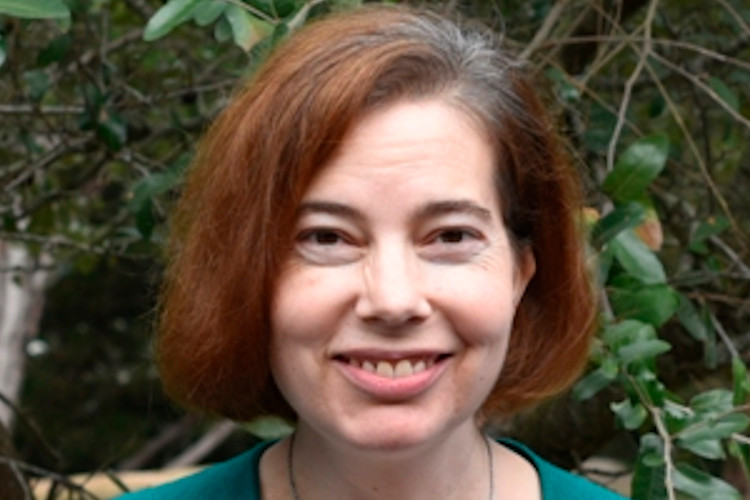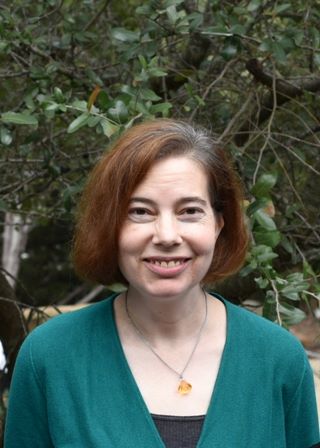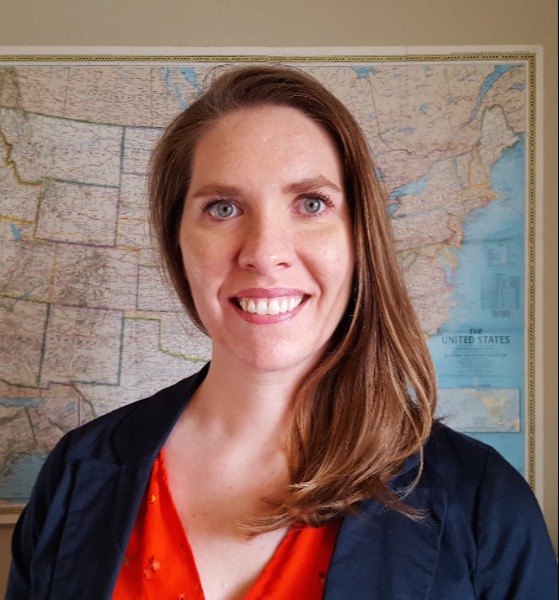Online Master of Science in Space Studies (MS)
This multidisciplinary program from American Public University (APU) deepens your understanding of the scientific principles that form the basis of the space industry. Gain career-relevant knowledge as you study how space operations, human space flight, and space science help expand our overall understanding of the universe.

About APU's Master’s Degree Program in Space Studies
Take a deep dive into the challenges associated with humankind’s exploration and interest in space. This online master’s degree program in space studies examines how the space industry fosters scientific breakthroughs to further our understanding of the universe.
Space exploration faces political, economic, legal, commercial, scientific, and technical hurdles. Our degree program and courses take an informed approach, drawing from faculty members who are experienced astronomy and aerospace leaders.
This master's in space studies uses an advanced curriculum originally designed by a former NASA astronaut and provides multiple perspectives on the history of space exploration and the space industry.
Students enrolled in our graduate study program have the opportunity to participate in research projects that utilize the university’s online robotic telescope. For instance, our space studies Supernova Search Program actively watches for supernova events by observing a core group of galaxies. Similarly, the Exoplanet Transit Group observes and delineates exoplanets' orbital and physical properties.
Students who join our research groups gain access to telescope images acquired from our Wallace E. Boston Observatory. The Observatory houses a research-grade, 24-inch aperture PlaneWave telescope with remote control functionality and is part of the Skynet Robotic Telescopic Network. Performing astronomical research allows students to apply knowledge gained in the classroom to real-life context.
Space Studies Degree Concentrations
Our University offers degree concentration options so students can examine specialty areas in greater depth. Each track considers various applications for space-related research.
Select a concentration to learn more.
About the Concentration
Provides an in-depth study in the discipline, with emphasis in both aircraft and spacecraft design/operations. Students take courses with comprehensive overviews of such topics as aircraft propulsion, aerodynamics and, aircraft design in addition to learning about orbital mechanics, rocket propulsion, and spacecraft design.
Program Objectives
Upon successful completion of this concentration, the student will be able to:
- Categorize the laws of orbital mechanics -- calculate and illustrate the effects that gravity has on two-body mechanics including spacecraft maneuvers such as transfer orbits and rendezvous.
- Apply scientific principles and calculate problems related to aircraft propulsion systems.
- Examine liquid and solid rocket propulsion fundamentals including propellants, combustion principles, components, and general turbo-pump, and motor design.
- Assess the development, technology, and importance of satellite communications in our modern technological society.
- Synthesize the fundamentals of aerodynamics and aircraft/spacecraft design, building upon past and current technology to shape innovations for the future.
About the Concentration
A diverse range of courses provide an inclusive synopsis of astronomy – from the Solar System to stars and galaxies. You will learn about astronomical instrumentation, with the opportunity to access the university’s observatory and the PlaneWave CDK24 robotic telescope.
Program Objectives
Upon successful completion of this concentration, the student will be able to:
- Demonstrate an in-depth understanding of Solar System -- including planets, comets, asteroids, and meteorites.
- Analyze the celestial objects found beyond our Solar System: stars, exoplanets, galaxies, and possible extraterrestrial life.
- Evaluate the geology of the Moon and Mars as related to their significance for near future human exploration of the Solar System.
- Critique the various configurations of telescopes and their use in the exploration of all types of electromagnetic radiation – from radio waves to gamma rays.
- Synthesize the history of astronomy, from ancient Greece to our modern cosmological model of the universe.
About the Concentration
The Earth and Planetary Sciences concentration is designed to provide students with an in-depth overview of our Solar System. Topics covered include planetary geology, with special emphasis on geology of the Moon and Mars. Small Solar System objects such as natural satellites, planetary rings, comets, and asteroids are also considered. Students study the origin of atmospheres on the Earth, Venus, Mars, and Saturn’s moon Titan. Planetary mapping techniques and GIS fundamentals are considered in this concentration as well.
Program Objectives
Upon successful completion of this concentration, the student will be able to:
- Use the scientific method and scientific tools to solve programs related to the Earth and planets.
- Identify the process and features associated with the Earth and planetary interiors, landscapes, oceans, and atmospheres.
- Demonstrate a comprehensive understanding of the interrelated physical, chemical, and geological processes operating on the Earth and other planets.
- Present earth and planetary science information clearly, in multiple formats (written, oral, graphically).
- Analyze the origin, composition, and nature of planetary atmospheres.
- Explain how terrestrial moons and planets are mapped utilizing state-of-the-art GIS techniques.
- Demonstrate good scientific ethics.
About the Concentration
The program helps to cultivate leaders in the space industry, not only in NASA, but in the commercial realm of space operations. This concentration is ideal if you already have an administrative or business background. Coursework includes space diplomacy and law, space operations and organizations, as well as the historical, political, economic, legal, commercial, scientific, and technical challenges comprising this complex and rapidly changing discipline.
Program Objectives
Upon successful completion of this concentration, the student will be able to:
- Examine the political and commercial significance of major national and international space missions, projects, and operations.
- Evaluate organizations that are critical to the success of the technological advance of space infrastructure in the United States.
- Assess the status of space cooperation and diplomacy between various space faring nations.
- Synthesize space laws and how the governing institutions affect applications such as remote sensing, communications, navigation, launch services, satellite exports, and arms control.
Gain a Career-Relevant Education Through APU’s Space Studies Degree Program
A graduate with a Master of Science in Space Studies might explore opportunities in the private sector, space education, or even government agencies involved in space exploration.
This online Master of Science program is designed to provide an in-depth overview of the space environment. You may also conduct your own research and examine data to collect insights into our universe.
Courses provide an eye-opening journey through the history of early rocketry, from the development of satellite navigation to modern space operations.
In addition to the institutional- and degree-level learning objectives, graduates of this space studies program are expected to achieve these learning outcomes:
- Develop an appreciation of the foundations and importance of space studies in the role of human space exploration/understanding of the cosmos
- Analyze quantitative and qualitative research and statistical data related to the support of aerospace science, astronomy, or space policy concepts
- Assess the history, chronology, and concepts for placing manned and unmanned vehicles in space
- Evaluate the importance of remote sensing satellites used to observe our Earth and other celestial bodies in the Solar System
- Synthesize the psychological and physiological elements necessary to support human life in the space environment, including spacesuit design/development
Courses examine the research protocols, technological advancements, and political influences that collectively shape modern space exploration. Students consider how human space flight and cutting-edge remote sensing technologies contribute to public- and private-sector developments in the space industry. This space studies master’s degree also helps prepare graduates to pursue career opportunities such as:
- Aerospace operations analysts, who review mission data to help optimize aircraft/spacecraft performance and ensure safe, efficient aerospace activity
- Observatory technicians, who use telescopic equipment to collect and process data to deepen our understanding of the solar system
- Remote sensing specialists, who use satellite imagery and geospatial tools to monitor planetary surfaces and provide actionable insights for climate research, resource management, and/or disaster response
- Space policy analysts, who review the regulations, treaties, and trends that impact the space industry and advise organizations on issues that include compliance and risk management
This Master of Science in Space Studies program incorporates coursework designed to develop technical, analytical, and leadership skills. Students consider how the concepts they discuss in the virtual classroom translate to real-life situations that arise within the space industry.
As they study the scientific theories and principles that foster space exploration, learners also complete exercises that teach them how to:
- Apply knowledge of flight dynamics to solve real-world aerospace challenges
- Analyze data to deepen their understanding of stellar, planetary, and galactic phenomena
- Assess planetary surface processes to understand the relationship between climate conditions and the environment
- Evaluate space regulations to better understand how governments and private organizations make strategic decisions regarding space exploration
“ The MS in Space Studies has broadened my understanding of various aspects of space science, from planetary geology to space policy. Additionally, the online format has enabled me to connect with a diverse group of fellow students from different backgrounds and regions. ”
MS, Space Studies
Browse Courses from APU’s Space Studies Program
American Public University’s space studies program offers an immersive online learning experience, with coursework designed to strengthen students’ understanding of our nation’s space program and how it contributes to scientific advancements. Learners who pursue this master’s degree discuss aerospace science, astronomy, earth and planetary science, and space policy.
IT IS HIGHLY RECOMMENDED THAT YOU HAVE PREVIOUSLY COMPLETED COLLEGE ALGEBRA BEFORE TAKING THIS COURSE
Explore Opportunities to Gain Hands-On Experience in Space Exploration
Students can join the APUS Analog Research Group (AARG) to gain hands-on research experience and work on-site in facilities that replicate the living conditions in space. AARG and other student organizations present research opportunities and add real-life context to the subject matter students explore through required courses.
Skills For a Changing Future
Test
-

Navigate technology and AI with confidence, clarity, and purpose.
-

Question boldly, think deeply, and make smarter decisions.
-

The Adapt faster, innovate fearlessly, and keep moving forward.
APU is here to support your student journey
We know your well-being is vital to your success. That's why we offer a range of supportive resources to help you throughout your academic journey.
- Career Coaching
- 24/7 Mental Health Support
- Admissions & Advising Support
- Student Life
Career Coaching
Get individualized guidance to help you explore career options, strengthen professional skills, and prepare for the next step in your journey. Whether you’re just entering the workforce, changing fields, or advancing your professional knowledge, our career services team is here to help you translate your goals into action.
Learn More24/7 Mental Health Support
Your well-being is essential to your success. That’s why APU offers access to confidential, flexible, and around-the-clock mental health support. Through our partnerships with telehealth apps, you can connect with peers and professionals anytime you need to manage stress, maintain balance, or find motivation.
Learn MoreAdmissions & Advising Support
From your first course to the day you graduate, our admissions and advising teams are here to guide you every step of the way. You’ll receive personalized assistance with enrollment, program selection, and degree planning from professionals who understand the needs of adult learners.
Learn MoreStudent Life
At APU, learning extends far beyond the classroom. Enrich your college experience and expand your network by getting involved in any of our student organizations. From cultural and social organizations to program-specific honor societies, you’ll find a group to help you thrive during and after your studies.
Learn MoreChoose APU’s Space Studies Degree Program for an Affordable Online Education
As an online institution, APU helps space studies students save on education. Our University’s low-cost tuition rates and specialized grants help reduce out-of-pocket expenses for those enrolled in our online space studies program.
- $0 Application Fee
- $0 Textbooks & Ebooks
- $0 Transfer Credit Evaluation
Earning a degree is a valuable investment, but it needs to fit into your budget. Our tuition estimator can help you estimate your tuition and fees, so you can plan a manageable path to your educational goals. For full details, please refer to the financial aid cost of attendance (COA). This estimate does not include course materials, supplies, equipment, software and other expenses such as lab fees. You may eligible for partnership grants through your employer. Speak with your admission representative for more details.
APU Removes Barriers
Quality Education Shouldn’t Break the Bank
We offer special rates and grants for eligible students and limit fees to help keep the cost of higher education within reach. Find out how you can save on tuition expenses with our:
- Transfer Credits
- Financial Aid
- Private Loans & Scholarships
- Military & Veteran Benefits
Transfer Credits
APU makes it easy to earn credit for the work you’ve already done. We accept transfer credits from prior college coursework, professional training, exams, and certifications. We’ll evaluate your transcripts at no cost and help you maximize eligible credits so you can save time, reduce costs, and stay focused on reaching your education goals sooner.
Learn MoreFinancial Aid
We’re committed to making quality education accessible and affordable. APU participates in federal financial aid programs, including grants and loans for those who qualify. Our Financial Aid Office can provide personalized guidance to help you understand your options, complete required forms, and make an informed decision about paying for your education.
Learn MorePrivate Loans & Scholarships
In addition to federal financial aid, some APU students choose to explore private education loans or external scholarships to help fund their studies. We encourage all students to first complete the Free Application for Federal Student Aid (FAFSA) to determine eligibility for federal student aid before considering private options. Be sure to research lenders carefully, compare terms, and understand your rights and responsibilities as a borrower.
Learn MoreMilitary & Veterans Benefits
Learn More
Apply to This Space Studies Degree Program Today
American Public University’s online space studies program allows you to connect with other students from anywhere in the world. Classes have no set login times, and you can access course materials 24/7 via your computer. You will complete assignments each week and engage in thought-provoking discussions with faculty and classmates.
- No Entrance Exams No GRE or GMAT required for master’s programs
- No Application Fee For undergraduate & master’s-level courses
- Courses Start Monthly Enroll now, start next month
- All APU master's degree/graduate certificate programs require a bachelor’s degree (or higher) from an institution whose accreditation is recognized by the Council for Higher Education Accreditation (CHEA®). Please read all graduate admission requirements before applying to this program and be prepared to submit the required documentation.
- There is no fee to complete the APU admission application for this program. View steps to apply.
CHEA® is a registered trademark of the Council for Higher Education Accreditation.
Our Faculty Will Guide You Through the Space Environment
Highly accomplished researchers and practitioners lead our master's courses. They help students consider space from a new perspective, and their direct experience in space-related fields enlivens our space sciences curriculum.
Students are granted direct access to educators who teach each course with passion and excitement. Our faculty have served in diverse roles as NASA engineers, observatory scientists, and space policy experts.
We are living during a fascinating time in space studies. The technologies, programs, and policies shaping how humans become a multi-planet species are being created and refined. The space field needs trained and knowledgeable individuals passionate about space exploration and creating off-world settlements to achieve humanity's goals as we journey beyond Earth. The APU Space Studies program offers concentrations and, especially, research opportunities that will help prepare students to be part of the growth and expansion of the space field today and tomorrow.


Dr. Albin’s love of planetary sciences and aviation is evident in every course he teaches. Involved in space science since the late 1980s, Dr. Albin has mainly focused his studies on the moon, Mars, and asteroids. He is also a certified commercial helicopter pilot.

Dr. Miller heads the Supernova Search Research Group and the APUS Analog Research Group, in addition to co-advising the Exoplanet Research Group. She also co-advises the University’s student chapter of the American Institute of Aeronautics and Astronautics and is the co-editor-in-chief of the Space Education and Strategic Applications Journal.

Dr. Milliman is a co-advisor of the Exoplanet Research Group. She has led a WIYN Open Cluster Study (a consortium of investigators representing Wisconsin, Indiana, Yale, and the National Optical Astronomy Observatory (NOAO)), an industry panel discussion, and has presented at several conferences and meetings.
Learn More About Pursuing a Master’s Degree in Space Studies
Find out how APU’s online courses, research opportunities, and extracurriculars help prepare students with career-relevant knowledge and skills. Get answers to common questions from students interested in master’s-level space programs.
Before you pursue a degree in space studies or a related field, consider how the curriculum aligns with your personal interests and career goals. As a space studies major, for example, you will have the opportunity to explore topics such as aerospace science, astronomy, planetary sciences, and space policy.
Space studies is considered a STEM (science, technology, engineering, and mathematics) discipline. Students discuss advanced technical and scientific principles as they gain hands-on experience through lab assignments and research projects.
The APUS Analog Research Group (AARG) challenges learners to apply their space sciences knowledge and skills to real-world research. As members of AARG, students have the unique opportunity to participate in hands-on experiences called “analog missions.”
An analog mission simulates the experience of living off-world and working as an astronaut. In fact, AARG refers to members who participate in these analog missions as “analog astronaut crews.”
These crews travel to various locations (known as “habitats”) throughout the country. Habitats are nationally recognized facilities that mimic aspects of living conditions in space exploration. Crews live and work in isolation in these habitats for a given timeframe, performing a wide range of space-relevant research. Each mission, therefore, allows AARG members to better understand how it feels to conduct research in space.
Students interested in topics like space exploration and human space flight can enrich their experience at APU through the following organizations:
- Association for Women in Science (AWIS): On a mission to help women reach their full potential, AWIS advocates for and empowers women in science, technology, engineering, and mathematics.
- American Institute of Aeronautics and Astronautics (AIAA): AIAA is dedicated to shaping the future of space science and advancing aerospace engineering. It provides members with access to networking opportunities and professional development through resources that include publications, conferences, and continuing education courses.
- Students for the Exploration and Development of Space (SEDS): SEDS grants students the opportunity to make an impact in space exploration while networking with and learning from pioneers in space.
- Women in STEM (wSTEM): wSTEM advocates for increased female representation in STEM fields. This community also offers networking opportunities, professional development resources, and career development support to its members.
Each September, American Public University System (APUS) and Policy Studies Organization (PSO) host the annual Space Education and Strategic Applications (SESA) Conference, a virtual event that brings together students, alumni, educators, and space scientists. Attendees discuss the latest advancements within the space industry, and students have the opportunity to present their original research.
Students may also participate in the University’s space studies research groups to further enrich their experience at APU. These groups provide learners with the opportunity to examine images captured by our University Observatory, which houses a PlaneWave CDK24 reflective telescope with a two-foot-wide mirror. Using telescopic images from the observatory and other databases, learners can study and observe celestial bodies, including exoplanets, asteroids, and galaxies.
Request More Information
Interested in a specific program or wondering about the application process? Fill out the quick form below, and we’ll follow up with details tailored to your goals. Click here if you are a current student and need assistance.
Consumer Information
Maryland Residents learn more about costs, completion rates, median debt, and more.
The University reserves the right to accept or deny credits according to policies outlined on our University website. Please see the University's transfer credit policy webpage for complete information.
The Preferred Military Rate is $250 per credit hour for undergraduate and master's-level courses. This rate is available to all U.S. active-duty servicemembers, National Guard members, Reservists, and military families, including parents, spouses, legal partners, siblings, and dependents.
See all military student benefits.

.jpg)


